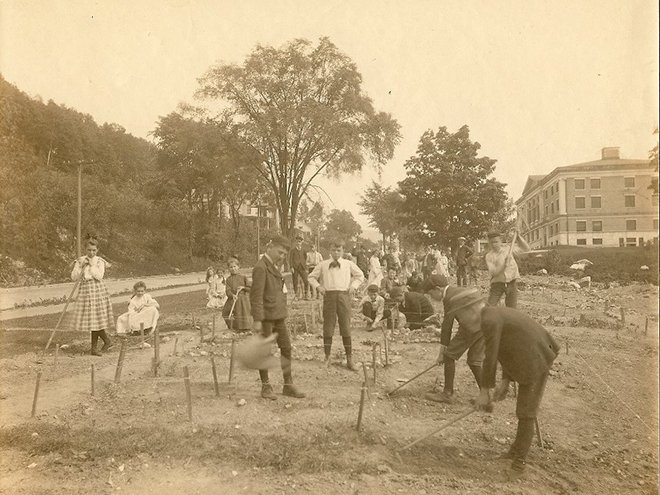Our History
Since our inception as the Normal School in North Adams in 1894, Massachusetts College of Liberal Arts (MCLA) has provided
educational access and exceptional learning opportunities to generations of students
and alumni. Over the years, MCLA has evolved to meet the needs of changing times.
In 1932, the Normal School became the State Teachers College of North Adams, reflecting the increased importance of education as an academic discipline. In 1960,
we changed our name to North Adams State College and expanded our focus to include professional degrees in business administration
and computer science. In 1997, with eyes focused on the horizon of a new century,
the College assumed a unique mission (within the state university system) as Massachusetts College of Liberal Arts, the public liberal arts college for the Commonwealth. Read our mission statement.
***
Fast facts about the Normal School
- Murdock Hall (pictured above) is the oldest building on the MCLA campus, and when it was built in 1897, it was the only building here
- The word "normal" meant that the school was teaching the basics to train students to become teachers in the public schools
 The normal school opened in 1897 with four teachers and 32 students. Out of those
32 students, only three of them were men
The normal school opened in 1897 with four teachers and 32 students. Out of those
32 students, only three of them were men- The first graduation ceremony had 53 graduates. The tradition of planting ivy at the base of the school began with the first graduating class
- The school's first principal was Frank Fuller Murdock. He was head of the school for 25 years and well respected
- In 1967, the building name was changed from College Hall to Murdock Hall in honor of Murdock. Margaret French Cresson, daughter of Daniel Chester French, who sculpted the Lincoln Memorial statue in Washington D.C., made a portrait relief and plaque in honor of Frank Fuller Murdock in 1922
History
- 1894 - Founded as North Adams Normal School, a two-year diploma program for teachers
- 1932 - Renamed the State Teachers College of North Adams, offering a four-year program leading to a Bachelor of Science in Education
- 1960 - Renamed the North Adams State College, with additional degrees in liberal arts, Business Administration, and Computer Science
- 1997 - Renamed the Massachusetts College of Liberal Arts (MCLA), reflective of specialty school status within the Massachusetts State College public system as The Public Liberal Arts College of Massachusetts; embarked on a campus Beautification Project through the Massachusetts Board of Higher Education Campus Performance Improvement Program (CPIP)
- 2004 - Collaborations with other institutions were initiated to strengthen MCLA's leadership position, launching Berkshire Compact for Higher Education, MCLA Gallery 51, and MCLA lead partner status for Berkshire STEM (Science, Technology, Engineering and Math) Pipeline Network
- 2005 - Gallery 51 opens
- 2006, 2007 - Major renovations completed on historic Murdock Hall and Smith House, restoring these landmark buildings to their former grandeur and equipping them with the latest technology
- 2008 - Governor Deval Patrick signs into law a Higher Education Bond Bill that includes $54.5 million for a new Center for Science and Innovation at MCLA
- 2009 - The state Division of Capital Asset Management and Maintenance (DCAMM) provides MCLA $1.3 million to support energy upgrades and conservation
- 2010 - Professional MBA program is launched and College establishes Center for Student Success and Engagement (CSSE)
- 2011 - Groundbreaking begins on the Center for Science and Innovation
- 2012 - The College completes a $5 million renovation of Hoosac Hall
- 2013 - Feigenbaum Center for Science and Innovation opens
- 2015 - Bowman Hall reopens after two years of construction that transformed it into
a state-of-the-art facility
Today, MCLA continues to innovate. We guide students as they develop critical thinking,
communication and leadership skills both in class and through a range of high-impact
experiences.
Though changing times present new challenges and opportunities, the essential nature
of MCLA remains constant: a place that delivers a high-quality, affordable public
liberal arts education in an environment that supports the development of intellectual
and practical skills, promotes scholarship and inquiry, and challenges students to
model personal, social and civic responsibility. Visit us.
